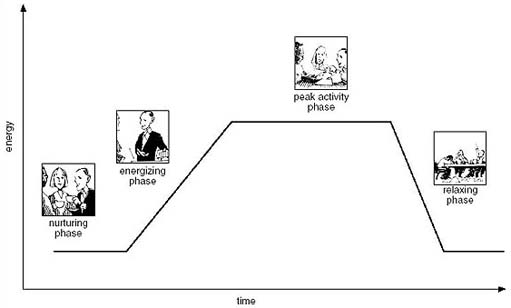3.2.6 The creative cycle
The creative cycle refers to the cycle of development that takes place within a single meeting of a group, as opposed to the longer-term cycle just described which may occur over many meetings. As in the case of the longer-term cycle, the creative cycle can be thought of as occurring in four phases: nurturing, energising, peak activity and relaxing (Figure 7).
Groups which function well usually have some sort of intuitive understanding of this cycle and have evolved a way of working that synchronises their work to the rhythm of their own creative cycle. Formal groups often fail because they fail to recognise the existence of this cycle or try to leave out one or more stages. For example, many committees and formal groups do not acknowledge the nurturing phase and get down to business as soon as all the members are present. These groups may find that their meetings are stiff and unproductive, and that they never really get going. A simple device for establishing this stage is to arrange for coffee or some form of refreshment prior to the business and to encourage members to use the time to mix informally with each other. Another device is to deal with the less important or routine matters during this 'warm up' period. If the main business of a meeting is the first item on the agenda then the proceedings may be slow and unproductive, because the energising phase has been missed out. There is an appropriate time for everything in a meeting, and people who are successful at handling meetings have an intuitive feel for this. The main business should be tackled once the group is energised, not any earlier and certainly not after the peak activity phase has been passed. (The most reliable indicator of a group's energy state is how any particular member feels at the time.) It is important to recognise the relaxing phase. If business is introduced into this stage, it will be cursorily dealt with and may even undo some of the work done earlier. Furthermore, meetings ended too quickly, before the relaxing phase is completed, will leave members with a sense of dissatisfaction or incompleteness. As the pace of organisational life quickens there is increasing pressure on managers to rush from one meeting to the next, to start and finish at peak performance, often to the detriment of the effectiveness of the meeting.

